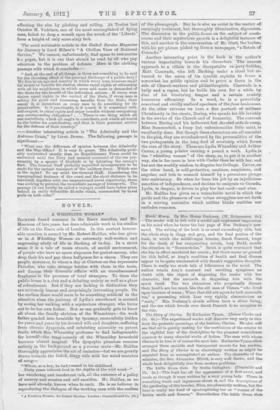NOVELS.
A WHISTLING WOMAN.*
DICKENS found romance in the Essex marshes, and Mr. Morrison of late years has done admirable work in his studies of life on the Essex side of London. In this context honour- able mention is earned by Mr. Robert Halifax, who has given us in A Whistling Woman an extremely well-written and engrossing study of life in Barking of to-day. In a strict sense it is a tale of mean streets, of sordid environment, of people who have no spare sixpences for pocket-money, who drop their h's and pay three halfpence for a shave. They are people, moreover, to whom a day at Clacton-on-Sea represents Paradise, who take strange bottles with them in the train, and discuss their domestic affairs with an unembarrassed frankness in the presence of total strangers. To them the public-house is a club and a debating society as well as a place of refreshment. But if they are lacking in distinction they are extremely human and surprisingly interesting people. On the surface there would seem to be something artificial in the situation when the jealousy of Lydia's sweetheart is aroused by seeing her walking with a mysterious stranger, who turns out to be her own father. But as one gradually gets to know all about the family skeleton of the Whambleys—the weak father goaded into homicide by tyranny, successfully hidden for years and years by his devoted wife and daughter, suffering from chronic dyspepsia, and subsisting miserably on patent foods, which Mrs. Whambley professes to find indispensable for herself—the tragi-comedy of the Whambley household becomes almost magical. The dyspeptic phantom remains entirely in the background as a p ersona meta—Mr. Halifax thoroughly appreciates the art of omission—but we are greatly drawn towards the faded, dingy wife with her weird snatches of song- " Where, as a boy, he had.roamed in his childhood
Forty years without food in the depths of the wild wood—" her wandering and incoherent talk, all the outcome of a policy of secrecy and evasion and self-sacrifice. Mr. Halifax, as we have eaid already, knows when to omit. He is no believer in reproducing the dialogue of the working man with the realism
• A II/Matins Woman. By Itobert Iiaiifux. Loudon: Constable and Co. [Cs.]
of the phonograph. Bat be is also an artist in the matter of seemingly irrelevant, but thoroughly illuminative, digression. The discussion in the public-house on the subject of mush- rooms and their mysterious growth is a delightful instance Of this, and another is the conversation of Mr. Slatt, the barber, with his pet phrase picked up from a newspaper, "a Sotnia of Cossacks."
Another interesting point in the book is the author's curious impartiality towards his characters. The nearest approach to a villain is the disreputable ex-jerry-builder, Matt Casswade, who left Barking under a cloud but re. turned to the scene of his ignoble exploits to brave a, somewhat lax public opinion and to prove a thorn in the aide of Church-workers and philanthropists. Casswade is a bully and a rogue, but he holds his own for a while by dint of his blustering tongue and a certain crudely humorous effrontery. In a word, he is a powerfully conceived and vividly realized specimen of the faux bonhomme. At the other extreme we have a fine portrait of militant Christianity in the curate, Dering, who spends his life lavishly in the service of the Church and of humanity. The contrast between Dering and his indiscreet but devoted aide-de-camp, Miss Summerbell, a fussy but nnbusinesslike little saint, is excellently done. But though these characters are all essential to the plot, they are overshadowed by the personalities of the two protagonists in the long duel of courtship which forms the core of the story. These are Lydia Whambley and Arthur Carter, a young printer earning a pound a week. Lydia. the " whistling woman" of the story, or, to pat it in another way, she is far more in love with Carter than he with her, and has not the worldly wisdom to disguise her feelings. Carter, on the other hand, is self-protective, cautious, suspicious, and angular, and loth to commit himself by a premature plunge into matrimony. So when he loses his job by an injudicious assertion of independence, and decides to emigrate to Canada, Lydia, in despair, is driven to play her last card—and wins.
Mr. Halifax has given us a remarkable novel in which the perils and the pleasures of our urban strugglers aro set forth in a moving narrative which neither blinks realities nor excludes romance.


















































 Previous page
Previous page